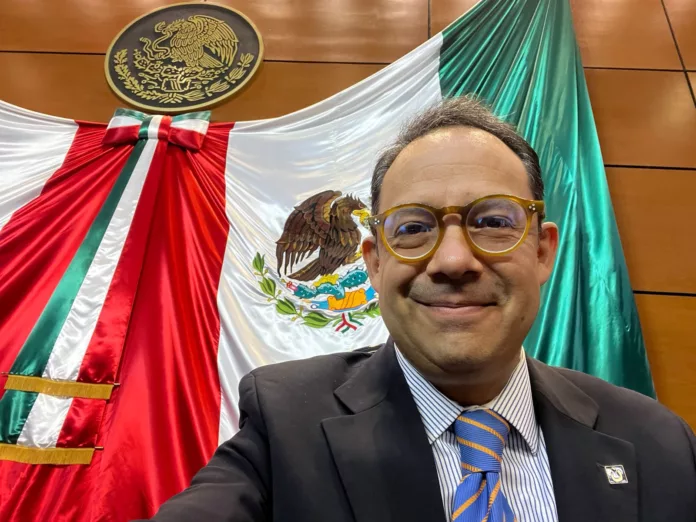Civil society leader and former Mexican Congressman, Rodrigo Iván Cortés, has been convicted of “gender-based political violence,” including digital violence, for social media posts on Twitter and Facebook referring to transgender-identifying Mexican Congressional representative, Salma Luévano, as a “man who self-ascribes as a woman”.
On Wednesday 9 August, Mexico’s highest court for electoral issues, the Superior Chamber of the Electoral Tribunal of the Federal Judicial Power, upheld the lower court’s guilty verdict, convicting Cortés of (i) gender-based political violence, (ii) digital violence, (iii) symbolic violence, (iv) psychological violence, and (v) sexual violence for his social media expression.
The Superior Chamber imposed a fine of $19,244.00 MXN, in addition to directing him to publish the court ruling and an apology drafted by the court on Twitter and Facebook daily for 30 days. Cortés also must take a course on “gender-based political violence” and register on the National Registry of Persons Sanctioned in Political Matters against Women.
“Disagreement is not discrimination, and peaceful dissent should never be penalized as violence. It is deeply disturbing that Cortés, who exercised his right to peaceably share his views on a matter of significant current debate, has been convicted as a violent offender when it is his opponents who are perpetuating unrest within Mexico’s political institutions,” stated Kristina Hjelkrem, legal counsel for ADF International, which is providing legal support to Cortés’ defense.
Cortés’ case parallels that of sitting Mexican Congressman Gabriel Quadri, who was similarly charged and convicted of “gender-based political violence” for Twitter posts, as a result of a complaint also filed by Salma Luévano. Quadri is pursuing justice at the Inter-American Commission on Human Rights and is awaiting a decision on admissibility there.
Delay in Justice
Cortés, head of advocacy group Frente Nacional por la Familia (FNF), was first convicted by a lower court for using masculine references on Twitter and Facebook regarding Luévano. The higher court ruling initially was expected two months ago, but was delayed due to requests for judicial recusal following publicized closed-door meetings between the judge and Luévano, demonstrating bias toward the transgender lawmaker.
In response to his conviction, Cortés stated: “This judgment is gravely disappointing—the suppression of speech and expression points to the demolition of democracy in Mexico. I am committed to seeking justice and securing mine and every Mexican citizen’s right to freedom of speech. No laws should be used to silence or punish individuals for sharing their convictions, especially on issues of great importance. Peacefully expressing the truth of biological reality can never be a crime”.
Series of 9 social media posts results in conviction
For full details on Cortés’ case, visit HERE.
Beginning in September 2022, the FNF expressed concern on Twitter that a bill presented by Luévano violated freedom of speech and religious freedom. The proposed bill aimed to penalize Christian teaching on sexuality as “hate speech”. It garnered significant attention when Luévano presented it in Congress wearing the vestments of a Catholic bishop.
Luévano filed a complaint against Cortés, arguing that 9 social media posts on Twitter and Facebook violated the right to be acknowledged as a woman and a “denial of identity”. Cortés was charged with “gender-based political violence”.
Luévano, together with transgender identifying representative María Clemente, has gained notoriety for fomenting unrest within Mexico’s Congress, including an incident where Clemente, supported by Luévano, physically wrestled with the president of the chamber to force him into relinquishing control of a congressional meeting in an attempt to expel Congressman Gabriel Quadri. Clemente also prompted international outrage by Tweeting explicit videos of Clemente’s own “sex work,” citing a right to freely share this kind of content on digital platforms.
Luévano and Clemente are members of the MORENA party, which has promoted constitutional amendments to enshrine “sexual rights,” without age distinctions (including minors); a proposal that the FNF criticized in one of the social media posts.
“The real purpose of this conviction is to silence me from saying what every concerned citizen needs to hear—that these actions and proposed laws are driving forward a radical agenda in Mexico, which poses a very serious threat to the wellbeing of our society, especially our children,” Cortés stated.
He added: “I remain committed to the peaceful expression of truth, the defense of our fundamental freedoms, and the protection of our children. Further, I reject violence on all grounds. One need only watch the videos of unrest in our Congress to see clearly that it is not me and my organization that is bringing chaos and disorder into Mexico’s political institutions”.
“Free speech is greatly threatened in Mexico at this time, and it has hit a crisis point with courts imposing severe censorship sanctions for the peaceful expression of views as evidenced by this egregious case. Unfortunately, Cortés’ case is far from an isolated incident,” said Hjelkrem.
“More and more, we are seeing the Mexican government violate its citizens’ fundamental and constitutional right to freedom of speech. Cortés spoke out, peacefully, in support of self-evident truth, and for that, he has been convicted as a violent offender and subjected to onerous punishments. Censorship is not compatible with a free society,” Hjelkrem added.
The fight for free speech in Mexico continues
With this judgment, Cortés has exhausted all options for legal remedy in Mexico. He plans to take his case to the Inter-American Commission on Human Rights with the support of ADF International.

